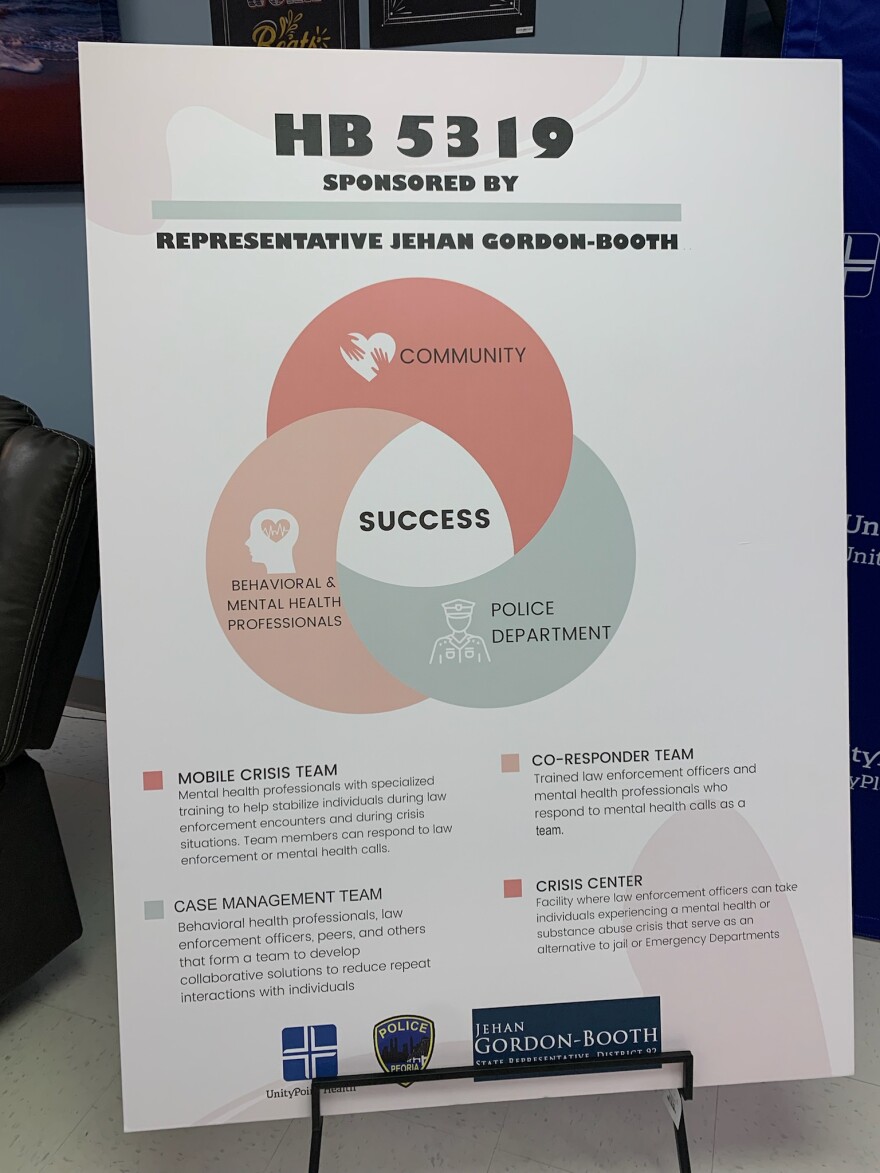Peoria police officers could soon be riding in squad cars with therapists and social workers if lawmakers approve a plan pitched by Rep. Jehan Gordon-Booth (D-Peoria).
Late last month, Gordon-Booth authored and introduced House Bill 5319 into the Illinois General Assembly. If approved, the bill would create and fund a pilot program in which Peoria police would work with staff from UnityPoint Health UnityPlace on 911 calls related to domestic violence, juveniles and other mental health crises.
Standing inside UnityPoint Health's UnityPlace Crisis Center on Monday, Gordon-Booth said her hometown is the perfect Illinois community to launch such an experiment.
“I’m a daughter of Peoria … for as long as I can remember, UnityPoint UnityPlace has been the behavioral health, mental health leader in this community,” she said. “Peoria is going to be a leader as it relates to communities that are not working with this approach.”

The idea of having mental health professionals involved with emergency response is not new; similar programs have been pitched across the state. In Chicago, some city lawmakers are pushing to move funding from the police department and into efforts that fund community resources, including mental health services.
Gordon-Booth said her pilot is tailored specifically to the needs of Peoria. She said the legislation also does not call for the "defunding" of any organization, but rather, funding for an entirely new approach relying on existing resources.
The lawmaker said she began brainstorming House Bill 5319 with Peoria Police Chief Eric Echevarria in December, right as Peoria wrapped up its deadliest year on record with 34 homicides. The duo worked with UnityPoint Health leadership to design the pilot.
On Monday, Echevarria said there are countless calls in which the presence of a crisis intervention-trained therapist or social worker would be of value to both a responding police officer and the individuals on scene. (Over 600 recent calls were categorized as "mental health calls," however, Echevarria said that number is likely undervalued).
The chief said there are many calls involving juveniles in which those arrested need counseling, not jail.
“We don’t want to see that juvenile again, and we want to be able to provide services for the family that we might not know are needed,” he said. “When the flower doesn’t bloom, you don’t … remove the flower. You fix the environment around it. ... That’s what we want to do.”
Echevarria worked in the Elgin Police Department before coming to Peoria last year. He said he participated in a similar co-responder program in Elgin.
What makes House Bill 5319 special, he said, is that the model would embed UnityPoint social workers in both the adult and juvenile divisions to not only respond to situations in real time – but to also provide case management and follow-up with children, teens and adults.
“The objective is to really de-escalate the situation, have someone on hand who can do an evaluation, and possibly have the involuntary committal done from there, and skip the ER visit, and come right to UnityPlace,” he said. “We want to be able to do this effectively, and efficiently, and safely. The social workers don’t want to respond, the mental health workers don’t want to respond by themselves, either. So we want to create this model where they’re working together, collaboratively.”
If the pilot program receives the green light from Springfield, Echevarria said he would assign officers who already have crisis intervention training to team up with UnityPoint. The department receives countless mental health calls each day, so Echevarria said this program would free up other patrol officers to be more “proactive,” as opposed to responding to “call after call after call.”
Hours-Long Standoff Ends With Suspect's Apparent Suicide

Mary Sparks Thompson is the president of UnityPoint Health’s UnityPlace. If House Bill 5319 is successful, Sparks Thompson said she would hire and train new staff specifically to work with police though the pilot.
Iowa-based UnityPoint Health is in talks with Illinois-based Carle Health regarding the potential merging of Central Illinois services. Such plans would have no impact on House Bill 5319.
UnityPoint Health Central Illinois Regional President and CEO Dr. Keith Knepp said it is the intent of both UnityPoint Health and Carle to leave UnityPlace's behavioral health and crisis services intact. He added that he looks forward to partnering with the police department.
“We should think about this pilot not just about the moment … when someone’s in crisis. What happens after that?” he said. “There’s detox opportunity … peer counseling … follow-up counseling.”
Knepp said he doesn’t want the public to link violence and mental health as one in the same.
“A lot of violence occurs outside the setting of mental health, and a lot of mental health needs that come from violence come because of the impact on the people who are affected by the violence,” he said. “Whether they’re in an abuse situation, or whether they become a victim, or they lose a family member. And those people don’t always know how to tap into resources.”
Echevarria said that addressing residents' mental health needs will keep everyone safer.
“We cannot arrest our way out of situations,” he said.
House Bill 5319 will be reviewed by members of the Police and Fire Committee this week at 8 a.m., Thursday, Feb. 17.
Read the bill in full here.


